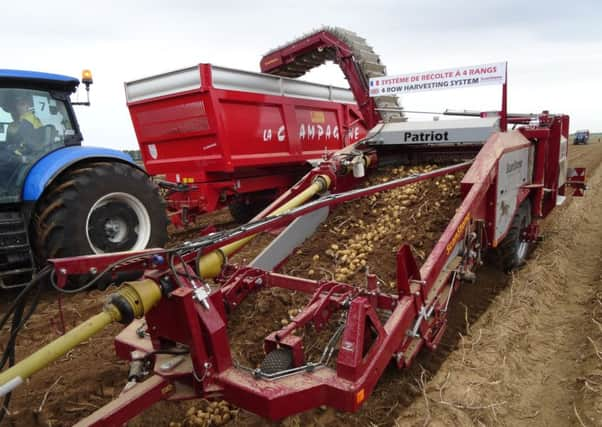Potatoes sector digs in on collective responsibility
This article contains affiliate links. We may earn a small commission on items purchased through this article, but that does not affect our editorial judgement.


Speaking before the Agricultural & Horticultural Development Board (AHDB) annual conference held at St Andrews, Dr Rob Clayton, the organisation’s potatoes strategy director, said that for the seed sector the industry’s reputation was precious.
“With regard to export, freedom from notifiable diseases such as ring rot and brown rot along with excellent low virus status continue to make GB produced seed attractive under the Safe Haven scheme,” he said.
Advertisement
Hide AdAdvertisement
Hide AdHowever, in recent weeks industry commentators had expressed fears that the high standing of the UK’s £150 million seed potato industry – which is concentrated in Scotland – could be under threat from growers on this side of the Border who used seed imported from other countries.
Clayton said that long-term reputation and sustainability of the industry should trump short-term commercial gain every time – adding that the AHDB was set to hammer home to producers the key importance of collective responsibility in maintaining the effectiveness of the Safe Haven certification scheme.
This scheme had been introduced in 2004 to protect the health of seed potatoes on Scotland and certain areas in the north of England by precluding the introduction of foreign-derived seedstocks, which could not be guaranteed free from ring rot and a host of other bacterial and soil-borne diseases after statutory controls had been lifted.
However, it had been reported in recent weeks that in order to speed up the availability of specific varieties, some processors had encouraged non-Safe Haven seed to be grown in Scotland. A similar challenge to the scheme had arisen in 2011 but an industry and media campaign had forced a rethink that bolstered the seed industry’s reputation.
Although Clayton said that his organisation would not become involved in a “name and shame” project to discourage the threat, he did not rule out the industry taking its own measures on this front.
Addressing the conference, Tony Bambridge, director of B & C Farming, said that it was crucial to maintain the high health of the seed industry as it stood at the very core of the country’s £4.8 billion potato industry.
He said that such short-term moves – together with the encroachment of ware growing into what had traditionally been seed-producing areas – represented a real threat to the country’s world-class seed industry.
• The theme of collective responsibility was extended to the AHDB’s new programme to tackle the growing problem of blackleg in potatoes.
Advertisement
Hide AdAdvertisement
Hide AdClayton said that as a result of a £300,000 project jointly funded by the Scottish Government and the AHDB, breakthroughs would allow work to be targeted on the areas where blackleg was getting into the system and help draw up best practice for a national hygiene programme.
Cinderella status
While farmers might fear that the relatively small income generating capacity of UK agriculture will give it Cinderella status in any possible Brexit negotiations, aligning the industry with the wider food and drink sector puts a different gloss on the picture.
That was the message from AHDB’s head of export, Peter Hardwick, when he reminded producers at yesterday’s seed potato conference that farming stood at the core of this enormous sector, which was worth £81.8bn in total – and £18.1bn in exports – each year to the UK economy.
He said that with its standing as the biggest single income generator, the sector dwarfed those of the car manufacturing and the pharmaceuticals industries. Turning to the threats and opportunities for the seed potato sector, he pointed out that although only a small proportion of UK seed exports went to the EU, the Brexit negotiations would also impact on non-EU trade relationships.
Citing an example he said that Scotland’s relationship with Egypt – which is expected to take 50,000 tonnes of Scottish seed this year – was based on our membership and compliance with EU rules and regulations.
“We need to ensure that something else replaces it when we leave,” said Hardwick. He said that this was entirely possible – but did require focus and resources.
